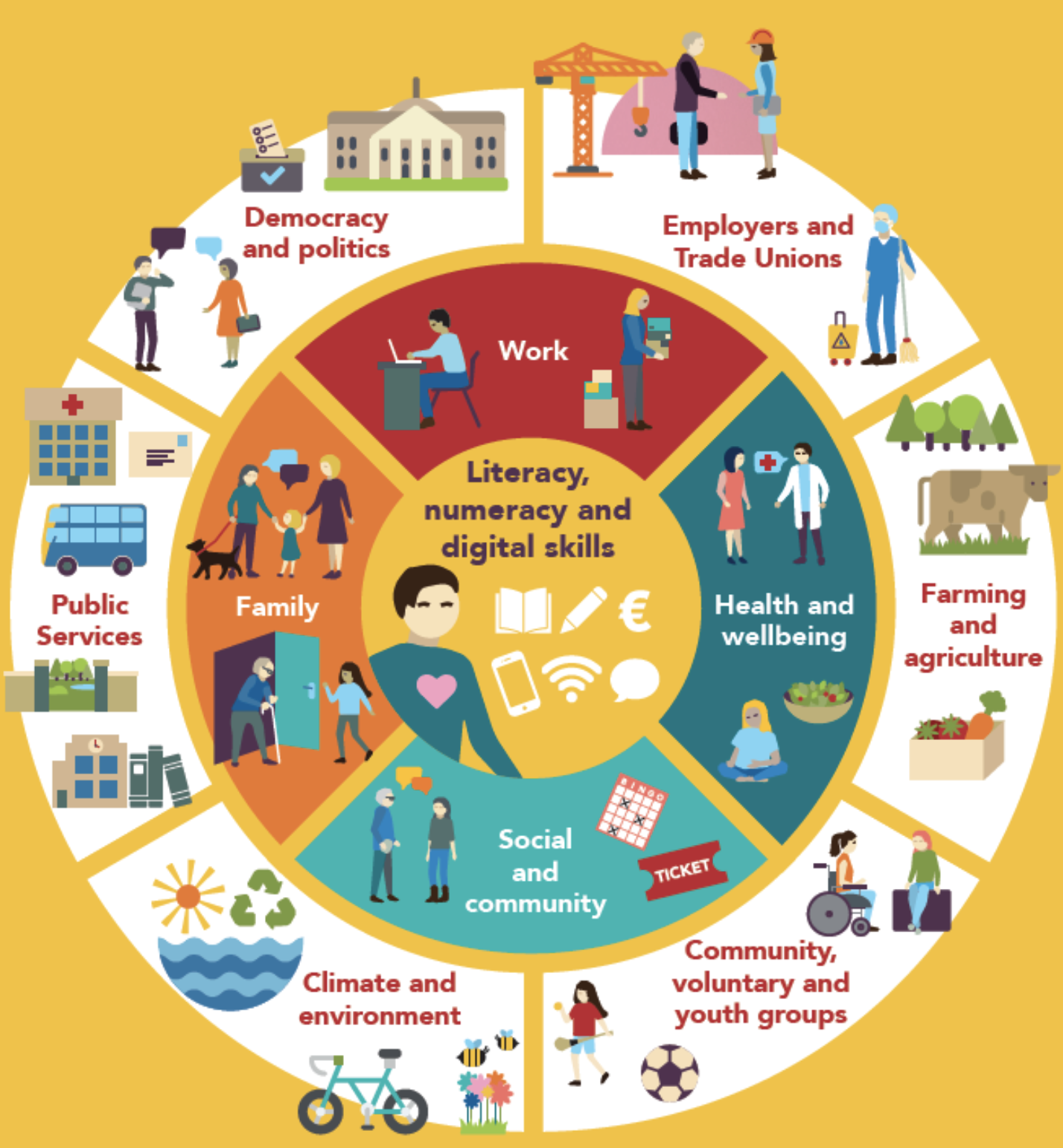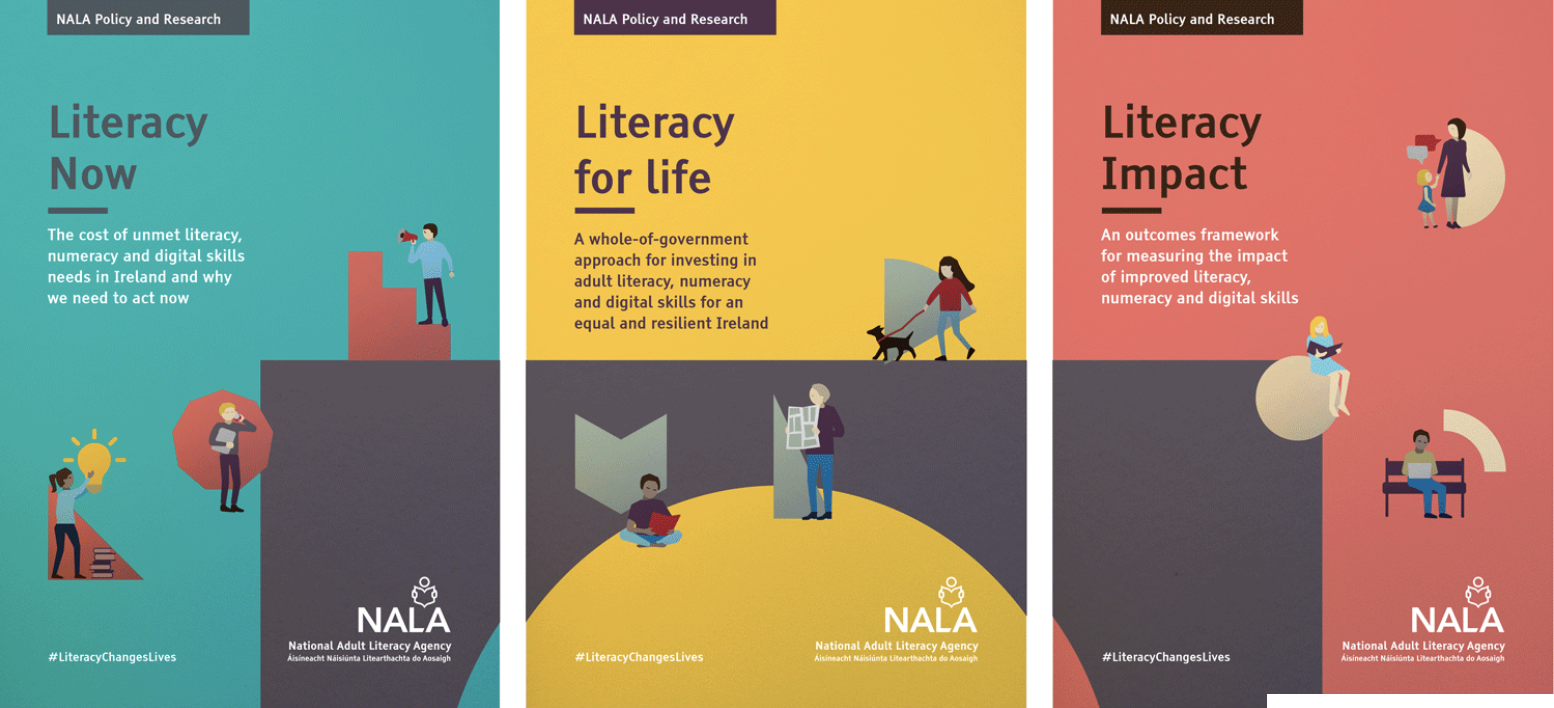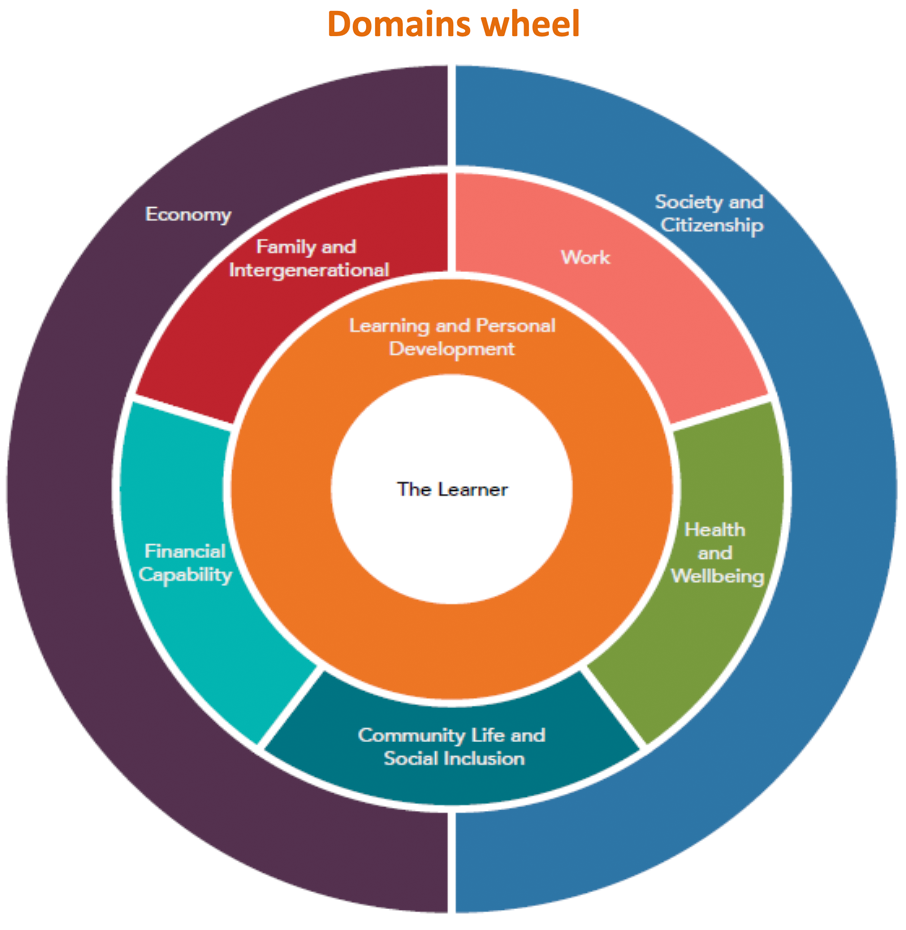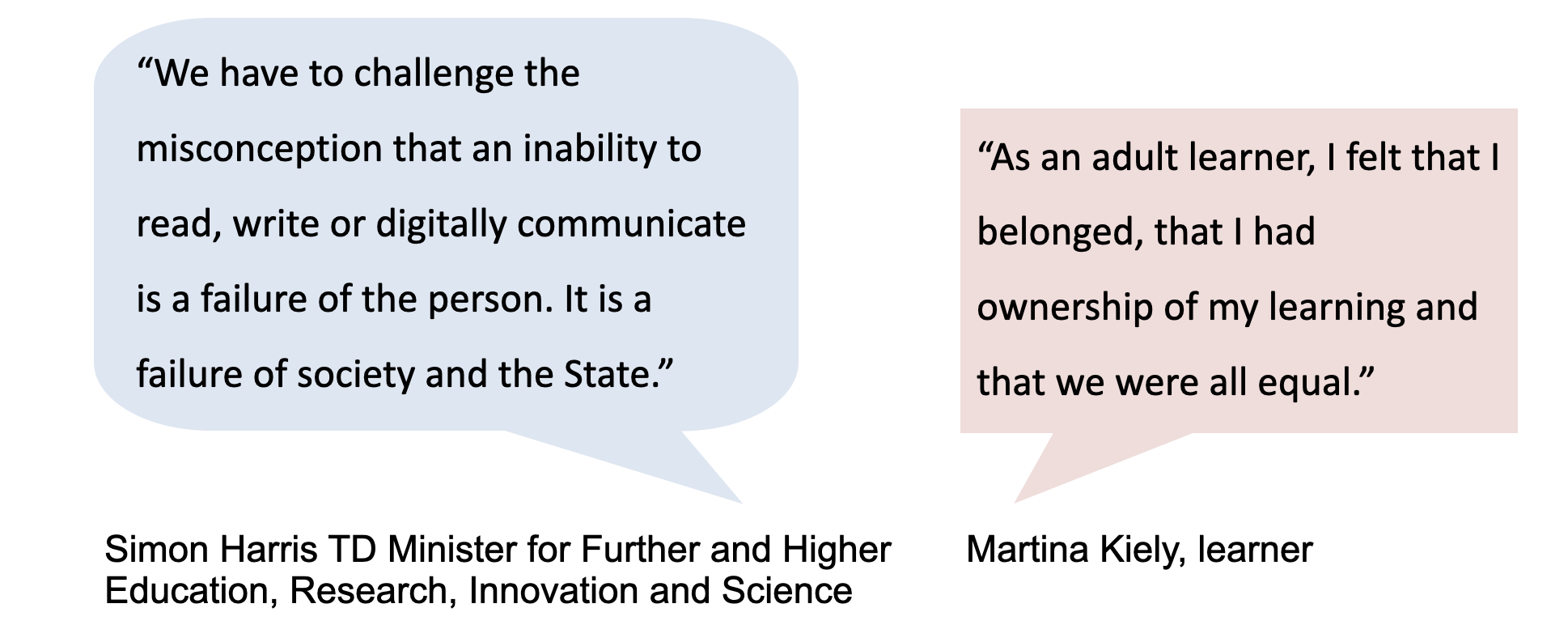Literacy for Life: Using a cross government, cross-economy and cross-society approach to build stronger adult literacy, numeracy and digital literacy
Author: Helen Ryan, Policy Officer with the National Adult Literacy Agency (NALA) in Ireland
Introduction
Literacy, numeracy and digital literacy skills are life skills that enable people to reach their full potential, be active and critical participants in society and help address poverty and social exclusion. Unmet literacy, numeracy and digital literacy needs have a devastating impact on individuals, families and communities. We believe literacy is a human right to which every member of society is entitled.
Defining literacy, numeracy and digital literacy

© Literacy, numeracy and digital literacy in everyday life (NALA, Literacy for Life page 56)
Literacy, numeracy and digital literacy skills involve listening, speaking, reading, writing, using numbers and everyday technology to communicate, access services, build relationships, understand information and make informed choices.
The definition of literacy and ‘literacies’ are evolving as these skills and ways we use them are changing all the time. Take the past year, for example, where we were faced with the COVID-19 pandemic and the new information and messaging we had to read, understand and act on.
Literacy, numeracy and digital literacy needs in Ireland
In the most recent International Adult Skills Survey – Programme for the International Assessment of Adult Competencies (PIAAC) – Ireland ranked in 17th place in adult literacy and 19th in adult numeracy out of 24 countries. Our results showed that:
- One in six (18%) of the adult population (aged between 16 and 65 years old) struggled with reading and understanding everyday text. For example, reading a bus timetable or medicine instructions.
- One in four Irish adults (25%) had difficulties using maths in everyday life. For example, basic addition, working out a bill or calculating averages.
- 42% of Irish adults struggled with basic digital tasks such as looking up a website or sending an email. A recent Cedefop survey showed that over half (55%) of the adult population has low digital skills.
Note that the majority of people who have digital literacy needs have underlying literacy issues.
Literacy and equality
Literacy is a human right to which every member of society is entitled. However only some members of our society have the literacy they need to flourish, thrive and reach their full potential.
Literacy is a barometer of equality and is the gateway to creating a society that is better and equal for all. At present, those who need to access education and training the most, benefit the least. This is the Matthew effect where “without intervention, those who have acquired more education get more and those that have not, get little or nothing.” Adult literacy needs are rooted in education and wider systemic inequalities and we need to address this.
NALA believes that priority should be given to those most in need, the furthest behind first. This is a principle in the UN 2030 Agenda for Sustainable Development. It means that where funding is limited, State investment should target those most in need. Within such a framework, the needs of those with low or no education and less than a Level 4 qualification would be met first. These adults are most at risk of unemployment, poverty and social exclusion in a changing world. Vulnerable adults, who cannot access supports or are refused help when they need it, may not seek help again. For the furthest behind first, there must be enhanced and targeted opportunities and supports for literacy, numeracy and digital literacy learning.
Supporting unmet literacy, numeracy and digital literacy needs
In 2019 in Ireland, 67,000 adults accessed local adult literacy services around Ireland through the 16 local Education and Training Boards (SOLAS, 2020a). This is around 12% of those with unmet literacy needs. This includes adult literacy groups (including family literacy), English for speakers of other languages (ESOL), Intensive Tuition in Adult Basic Education (ITABE), Skills for Work (basic skills programme for employees) and one-to-one voluntary literacy tuition. On average adults received between 2 and 6 hours tuition per week with some intensive options available.
In 2020, the world dealt with the pandemic of Covid-19. Ireland, like many other countries, went into ‘lockdown’ with initially literacy support stopping and then engaging online or over the phone until face-to-face learning resumed. In that year, the number of adults getting literacy support decreased to 9,000. However, in 2021, the numbers increased again to 27,000.
Working together: the need for a coordinated approach
NALA works bi-laterally with many government departments and their agencies on policies aimed at building literacy, numeracy and digital literacy competence across a number of areas including health, community and finance. However, there is no coordination or alignment of this work across departments. Interdepartmental work that might happen often depends on the knowledge and goodwill of people working in different sections or areas.
UNESCO emphasises how countries need more policies and strategies that integrate literacy within a holistic, cross-sectoral, lifelong and life-wide perspective. NALA lobbied to bring all these departments and agencies together and take a whole-of-society and interdepartmental approach. This would allow for greater cohesion, bring opportunities for innovative development, enable people to share current and best practice and be more strategic and cost effective.
Advocating for change
The need for a coordinated central approach to be more effective, ambitious and strategic formed the basis for our lobbying efforts to our elected representatives and policy makers.
Political commitment
In February 2020, Ireland held a General Election to elect political representatives to the Dáil (parliament). Based on our policy and advocacy efforts, we managed to secure commitments from five political parties to supporting adult literacy and plain language in their manifestos during the election campaign.
In June 2020, three political parties formed a Coalition government – these were Fine Gael, Fianna Fáil and the Green Party. In the Programme for Government, there were commitments to:
- Develop and implement a new 10-year strategy for adult literacy, numeracy, and digital skills within the first year of the Government.
- Introduce a plain language requirement for all public service communication, so that people can understand information the first time they read or hear it. Using plain language saves time and money and reduces mistakes and complaints. We will consult with NALA.
There was also an appointment of a new Minister with responsibility for Further and Higher Education, Research, Innovation and Science (FHERIS).
Literacy for Life campaign: July 2020
NALA launched three publications: Literacy Now, Literacy for Life and Literacy Impact at a webinar in July 2020. These documents outlined the cost of unmet literacy, numeracy and digital skills in Ireland; along with a Whole-of-Government framework for addressing these needs and an outcomes framework for measuring impact.

|
1. Literacy Now |
Literacy Now examines key policy and practices in adult literacy, numeracy and digital skills and provides evidence to show why we must act now. |
|
2. Literacy for Life |
This report was commissioned by NALA and written by the Think-tank for Action on Social Change (TASC). It advocates for an approach that connects adult literacy with the concept of ‘resilience’ and outlines a whole-of-government framework. |
|
3. Literacy Impact |
Literacy Impact provides a framework for measuring the impact of improved literacy, numeracy and digital skills in Ireland. The report presents outcomes structured around eight domains and proposes sample indicators to measure evidence of impact. |

© Domains wheel from Literacy Impact (Page 21)
We submitted the documents to relevant policy makers and met the Minister for Further and Higher Education, Research, Innovation and Science (FHERIS), Simon Harris TD, to discuss them.
Developing the 10-year strategy
On International Literacy Day, 8 September 2020, the Minister for Further and Higher Education, Research, Innovation and Science (FHERIS), Simon Harris, announced his plans to develop a new 10-year strategy for adult literacy, numeracy and digital literacy skills for Ireland. The Minister gave SOLAS, the Further Education and Training Authority, the responsibility to develop the strategy.
In October, the Minister set up and chaired an Interdepartmental Stakeholder Group on the 10-year strategy and NALA is a member of this group. NALA also sat on a National Technical Advisory Committee to provide expert advice over the course of the strategy development period.
Consultation process
SOLAS prepared a consultation paper and invited submissions. During the consultation, SOLAS met 40 organisations, surveyed 1,100 people and 400 others participated in one to one meetings or focus groups. In May 2021, they published a summary report on the consultation and a detailed report.
NALA’s vision and approach
NALA spent a number of weeks engaging with our members, students, staff and Board on what should be included in a new 10-year strategy. Our submission called for a new vision and approach for the next decade to support people with unmet literacy, numeracy and digital literacy needs and prioritise the furthest behind first.
Adult Literacy for Life: A 10-year Literacy, Numeracy and Digital Literacy Strategy

On 8 September 2021, International Literacy Day, the Minister for Further and Higher Education, Research, Innovation and Science (FHERIS) launches the Government’s first ever 10-year adult literacy, numeracy and digital literacy strategy for Ireland. This strategy is a cross Government, cross-economy and cross-society approach to address evidenced unmet needs in literacy, numeracy and digital literacy in the adult population in Ireland.
The Strategy proposes a vision of “An Ireland where every adult has the necessary literacy, numeracy and digital literacy to fully engage in society and realise their potential.”

The approach will be underpinned by five guiding principles, which will ensure a connected system in which no one is left behind.
ALL Strategy Guiding Principles:

The strategy proposes an innovative, systems-based approach to literacy that works across Government, across economy, across society and across our communities. This involves coordinating resources, political leadership, national, regional and local focus along with a cross-government approach.
The Strategy proposes a range of commitments and actions across four pillars to ensure that:
- people can UNDERSTAND their needs and where to go to meet them
- they can ACCESS all of the learning and support they need
- the learning and support available can EXPAND to meet this massive challenge; and
- we EMPOWER people and communities to make a real difference to their lives.
There is more information about the strategy at the website: www.adultliteracyforlife.ie
Implementation of the strategy
In January 2022, the Minister for Further and Higher Education, Research, Innovation and Science, Simon Harris TD, chaired the first meeting of The Adult Literacy for Life (ALL) Strategy Implementation Group – a group tasked with driving literacy reforms. The Minister also announced that €3 million will be allocated for the implementation of the ALL Strategy in Budget 2022. NALA sits on the Implementation Group and we are eager to progress with the actions.
Conclusion
This is a very exciting time for adult literacy in Ireland. The 10-year strategy gives a shared vision, commitment and action plan to join forces and work together as Government (national and local), state agencies and organisations, employers, trade unions, civil society and communities to support unmet adult literacy, numeracy and digital literacy needs over the next 10 years. NALA welcomes this strategy and is ready to play its part in achieving real positive change. We want to see greater supports for people with unmet literacy, numeracy and digital literacy needs and prioritising the furthest behind first. This will help towards building an equal, resilient and happier society in Ireland.
Helen is a Policy Officer with NALA, Ireland’s National Adult Literacy Agency, where she has worked for the last 23 years. She has worked on a number of innovative projects over the years including delivering literacy over the television and radio, setting up workplace basic education programmes and developing literacy-friendly standards, guidelines and training for health and public services.
She was recently involved in the development and launch of three key policy documents for adult literacy in Ireland and coordinated NALA’s submission to the development of a new government strategy. In 2021, the Irish Government published Adult Literacy for Life, the first ever 10-year Adult Literacy, Numeracy and Digital Literacy Strategy.
The National Adult Literacy Agency (NALA)
NALA is the voice of adult literacy and numeracy in Ireland. We are a non-governmental organisation and registered charity in Ireland with nearly 2,000 members. We work to support adults with unmet literacy, numeracy and digital literacy needs. We also support organisations to deliver a literacy-friendly service, where they are aware and take account of literacy, numeracy and digital literacy needs and remove related barriers.
About this blog
This blog is based on a key note lecture at the EPALE and Erasmus+ Conference 2022: "Life Skills as a Focus in Adult Education"
References
Department of the Taoiseach (2020). Programme for Government: Our Shared Future
Kerckhoff, A. and Glennie, E. (1999). The Matthew Effect in American Education. Research in Sociology of Education and Socialization
NALA (2020a). Literacy Now https://www.nala.ie/publications/literacy-now/
NALA (2020b). Literacy for Life https://www.nala.ie/publications/literacy-for-life/
NALA (2020c). Literacy Impact https://www.nala.ie/publications/literacy-impact/
NALA (2020d). National Adult Literacy Agency submission to the 10-year Adult Literacy, Numeracy and Digital Literacy Strategy for Ireland: A Whole-of-Government approach 2020–2030.
SOLAS (2020a). Future FET: Transforming Learning
SOLAS (2020b). Adult Literacy, Numeracy and Digital Literacy Strategy Consultation Paper
SOLAS (2021a). A 10-Year Literacy, Numeracy and Digital Literacy Strategy for Ireland
SOLAS (2021b). Summary Report on the Consultation to develop a 10-Year Adult Literacy, Numeracy and Digital Literacy – Literacy for Life - Strategy for Ireland
SOLAS (2021c). Detailed Consultation Report from the process to develop a 10-Year Adult Literacy, Numeracy and Digital Literacy – Literacy for Life - Strategy for Ireland
United Nations (2015). Transforming our world: the 2030 Agenda for Sustainable Development
UNESCO (2019). Towards a new UNESCO Literacy Strategy




